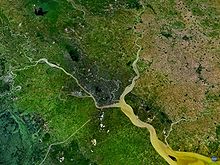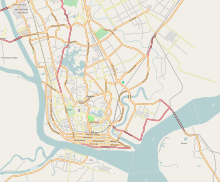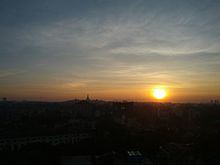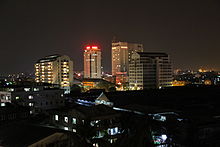
Yangon is located in Lower Burma (Myanmar) at the convergence of the Yangon and Bago Rivers about 30 km(19 mi) away from the Gulf of Martaban at 16°48' North, 96°09' East (16.8, 96.15). Its standard time zone is UTC/GMT +6:30 hours.

Cityscape
Until the mid-1990s, Yangon remained largely constrained to its traditional peninsula setting between the Bago, Yangon and Hlaing rivers. People moved in, but little of the city moved out.
Maps from 1944 show little development north of Inya Lake and areas that are now layered in cement and stacked with houses were then virtual backwaters. Since the late 1980s, however, the city began a rapid spread north to where Yangon International airport now stands. But the result is a stretching tail on the city, with the downtown area well removed from its geographic centre. The city's area has steadily increased from 72.52 square kilometres (28.00 sq mi) in 1901 to 86.2 square kilometres (33.3 sq mi) in 1940 to 208.51 square kilometres (80.51 sq mi) in 1974, to 346.13 square kilometres (133.64 sq mi) in 1985, and to 598.75 square kilometres (231.18 sq mi) in 2008.

Architecture
Downtown Yangon is known for its leafy avenues and fin-de-siècle architecture. The former British colonial capital has the highest number of colonial period buildings in Southeast Asia. Downtown Yangon is still mainly made up of decaying colonial buildings. The former High Court, the former Secretariat buildings, the former St. Paul's English High School and the Strand Hotel are excellent examples of the bygone era. Most downtown buildings from this era are four-story mix-use (residential and commercial) buildings with 14-foot (4.3 m) ceilings, allowing for the construction of mezzanines. Despite their less-than-perfect conditions, the buildings remain highly sought after and most expensive in the city's property market.

In 1996, the Yangon City Development Committee created a Yangon City Heritage List of old buildings and structures in the city that cannot be modified or torn down without approval. In 2012, the city of Yangon imposed a 50 year moratorium on demolition of buildings older than 50 years. The Yangon Heritage Trust, an NGO started by Thant Myint-U, aims to create heritage areas in Downtown, and attract investors to renovate buildings for commercial use.
A latter day hallmark of Yangon is the eight-story apartment building. (In Yangon parlance, a building with no elevators (lifts) is called an apartment building and one with elevators is called a condominium. Condos which have to invest in a local power generator to ensure 24-hour electricity for the elevators are beyond the reach of most Yangonites.) Found throughout the city in various forms, eight-story apartment buildings provide relatively inexpensive housing for many Yangonites. The apartments are usually eight stories high (including the ground floor) mainly because city regulations, until February 2008, required that all buildings higher than 75 feet (23 m) or eight stories install elevators). The current code calls for elevators in buildings higher than 62 feet (19 m) or six stories, likely ushering in the era of the six-story apartment building. Although most apartment buildings were built only within the last 20 years, they look much older and rundown due to shoddy construction and lack of proper maintenance.
An apartment building in the downtown sectionUnlike other major Asian cities, Yangon does not have any skyscrapers. Aside from a few high-rise hotels and office towers downtown, most high-rise buildings (usually 10 stories and up) are "condos" scattered across prosperous neighborhoods north of downtown such as Bahan, Dagon, Kamayut and Mayangon. The tallest building in Yangon, Pyay Gardens, is a 25-story condo in the city's north.
Older satellite towns such as Thaketa, North Okkalapa and South Okkalapa are lined mostly with one to two story detached houses with access to the city's electricity grid. Newer satellite towns such as North Dagon and South Dagon are still essentially slums in a grid layout. The satellite towns—old or new—receive little or no municipal services.
|
 ပင်မစာမျက်နှာ
ပင်မစာမျက်နှာ ကော်မတီသတင်းများ
ကော်မတီသတင်းများ မြို့တော်အသံလွှင့်အစီအစဉ်
မြို့တော်အသံလွှင့်အစီအစဉ် ရန်ကုန်မြေပုံ
ရန်ကုန်မြေပုံ ဌာနများ
ဌာနများ ဝန်ဆောင်မှုများ
ဝန်ဆောင်မှုများ ဥပဒေ၊နည်းဥပဒေများ
ဥပဒေ၊နည်းဥပဒေများ လေ့လာစရာရန်ကုန်
လေ့လာစရာရန်ကုန် အွန်လိုင်းဝန်ဆောင်မှုများ
အွန်လိုင်းဝန်ဆောင်မှုများ မီဒီယာများ
မီဒီယာများ ကြော်ငြာသင်ပုန်း
ကြော်ငြာသင်ပုန်း Myanmar SEADRM Project
Myanmar SEADRM Project Invitation For Expressions of Interest (EOI)For Development of Industrial Park With Essential Ancillary Infrastructure In New Urban Development of YGN
Invitation For Expressions of Interest (EOI)For Development of Industrial Park With Essential Ancillary Infrastructure In New Urban Development of YGN မြို့ပြမြေစီမံခန့်ခွဲမှုဌာနဆိုင်ရာ အသိပေးကြေညာချက်များ
မြို့ပြမြေစီမံခန့်ခွဲမှုဌာနဆိုင်ရာ အသိပေးကြေညာချက်များ အင်ဂျင်နီယာဌာန(ရေနှင့်သန့်ရှင်းမှု)၏ အသိပေးကြေညာချက်များ
အင်ဂျင်နီယာဌာန(ရေနှင့်သန့်ရှင်းမှု)၏ အသိပေးကြေညာချက်များ အင်ဂျင်နီယာဌာန(အဆောက်အအုံ)ဆိုင်ရာ အသိပေးကြေညာချက်များ
အင်ဂျင်နီယာဌာန(အဆောက်အအုံ)ဆိုင်ရာ အသိပေးကြေညာချက်များ လမ်းညွှန်ချက်ဗီဒီယိုများ
လမ်းညွှန်ချက်ဗီဒီယိုများ FAQs
FAQs Privacy Policy
Privacy Policy အကြံပြုရန်နှင့်ပြန်ကြားစာ
အကြံပြုရန်နှင့်ပြန်ကြားစာ ဆက်သွယ်ရန်
ဆက်သွယ်ရန် ဌာနများ၏ လုပ်ငန်းဆောင်ရွက်မှု မှတ်တမ်းဓာတ်ပုံများ
ဌာနများ၏ လုပ်ငန်းဆောင်ရွက်မှု မှတ်တမ်းဓာတ်ပုံများ မြို့ပြမြေစီမံခန့်ခွဲမှုဌာနမှ ကန့်ကွက်နိုင်ကြောင်းကြော်ငြာများ
မြို့ပြမြေစီမံခန့်ခွဲမှုဌာနမှ ကန့်ကွက်နိုင်ကြောင်းကြော်ငြာများ



